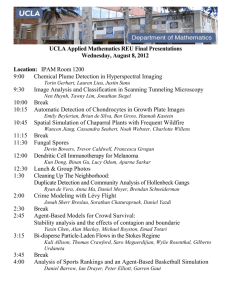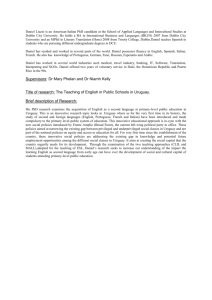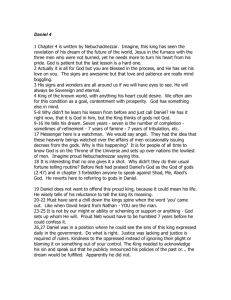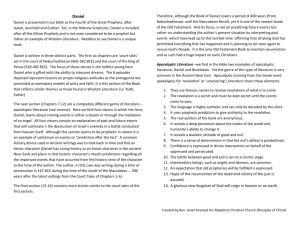Daniel Pelka SCR, learning for schools
advertisement
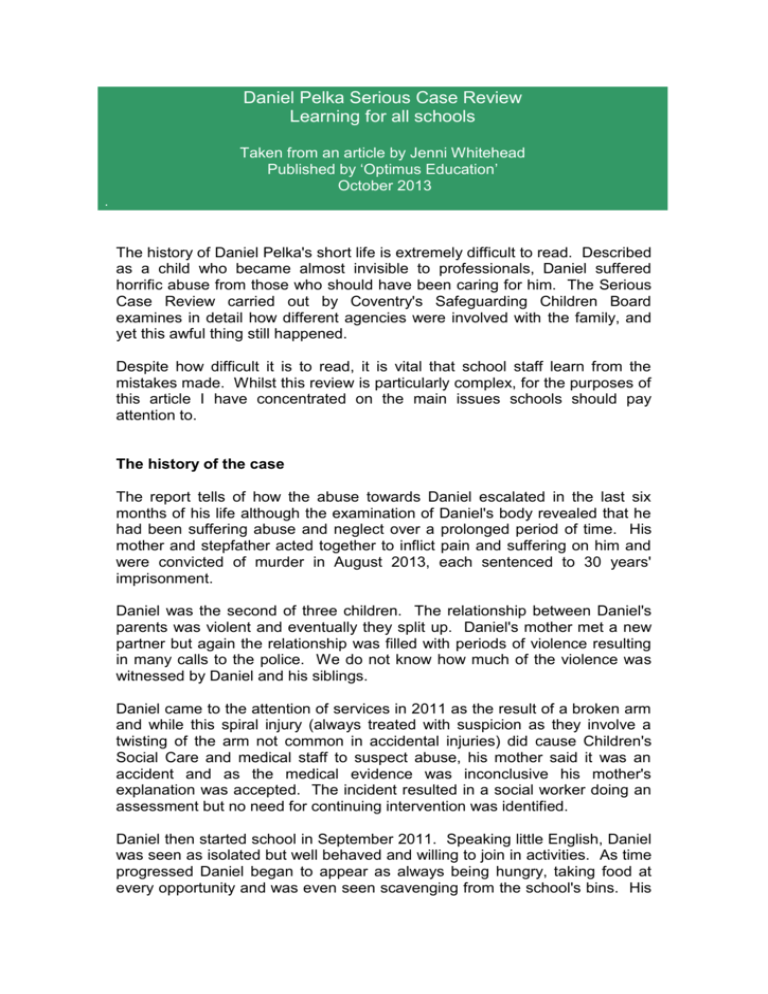
Daniel Pelka Serious Case Review Learning for all schools Taken from an article by Jenni Whitehead Published by ‘Optimus Education’ October 2013 . The history of Daniel Pelka's short life is extremely difficult to read. Described as a child who became almost invisible to professionals, Daniel suffered horrific abuse from those who should have been caring for him. The Serious Case Review carried out by Coventry's Safeguarding Children Board examines in detail how different agencies were involved with the family, and yet this awful thing still happened. Despite how difficult it is to read, it is vital that school staff learn from the mistakes made. Whilst this review is particularly complex, for the purposes of this article I have concentrated on the main issues schools should pay attention to. The history of the case The report tells of how the abuse towards Daniel escalated in the last six months of his life although the examination of Daniel's body revealed that he had been suffering abuse and neglect over a prolonged period of time. His mother and stepfather acted together to inflict pain and suffering on him and were convicted of murder in August 2013, each sentenced to 30 years' imprisonment. Daniel was the second of three children. The relationship between Daniel's parents was violent and eventually they split up. Daniel's mother met a new partner but again the relationship was filled with periods of violence resulting in many calls to the police. We do not know how much of the violence was witnessed by Daniel and his siblings. Daniel came to the attention of services in 2011 as the result of a broken arm and while this spiral injury (always treated with suspicion as they involve a twisting of the arm not common in accidental injuries) did cause Children's Social Care and medical staff to suspect abuse, his mother said it was an accident and as the medical evidence was inconclusive his mother's explanation was accepted. The incident resulted in a social worker doing an assessment but no need for continuing intervention was identified. Daniel then started school in September 2011. Speaking little English, Daniel was seen as isolated but well behaved and willing to join in activities. As time progressed Daniel began to appear as always being hungry, taking food at every opportunity and was even seen scavenging from the school's bins. His mother was spoken to but told staff that he had health problems including obsessive eating. School staff failed to link behaviour As Daniel grew thinner his teachers became increasingly worried and, along with the school nurse, sought help from the GP and the community paediatrician. Daniel also came to school with bruises and unexplained marks. Whilst these injuries were seen by different school staff members, they were not recorded nor were they linked to Daniel’s concerning behaviour regarding food. No onward referrals were made in respect of these injuries. At times, Daniel’s school attendance was poor and an education welfare officer was involved. Whilst the injuries were seen by different school staff members, they were not recorded nor were they linked to Daniel’s concerning behaviour regarding food In February 2012 Daniel was seen by a community paediatrician, but his behaviours regarding food and low weight were linked to a likely medical condition. The potential for emotional abuse or neglect as possible causes was not considered. The paediatrician was unaware of the physical injuries that the school had witnessed. Three weeks after the paediatric assessment Daniel died as a result of a head injury. Daniel was found to be malnourished at the time of his death and had an acute subdural haematoma to the right side of his head, as well as other bruises on his body. Subsequent pathological examination also identified older mild subdural haematoma. The trial of Daniel's mother and her partner revealed that he had been beaten, starved, force fed salt, submerged in the bath until he lost consciousness and locked in a room by himself for long periods of time. Daniel did not die of starvation and, according to the report, while he was severely malnourished he could have recovered. Having looked at the facts of the case it is useful to examine the way that Daniel’s school responded to identify what lessons can be learnt from the concerns raised in the report. Concerns raised about the school's response Focus on medical causes and lack of communication with other agencies School staff were concerned about Daniel's apparent obsession with food and his weight loss and talked to his mother about this, but accepted his mother's explanation that his problems were medical. Once Daniel's problems were categorised as ‘medical’ the school went down the medical route to try to establish causes and solutions. Although the school involved the school nurse, GP and the community paediatrician the review reports concern about the lack of referral to Children's Social Care in respect of the injuries Daniel had. The report is also critical of the relationship between the school nursing service and the school. The school made direct contact with the GP in January 2012 by which time there had been three failed appointments with the community paediatrician, although this was unknown to the school. Daniel was eventually seen by the community paediatrician and the school wrongly believed this was an outcome of its contact with the GP, when in fact it was as a result of an earlier referral by the school nurse. There was clearly no effective coordination between the school and the school nursing service which were both attempting to respond to Daniel’s behaviours in separate ways when they could have been more effective if they collaborated and shared each other’s concerns. The lack of communication between agencies features very prominently in the report and this would have made it easier for Daniel's mother to play one professional off against the other, masking a deteriorating situation for Daniel. Lack of understanding of the mother-child relationship Daniel's mother was not viewed by school leaders as uncaring despite the fact that one teaching assistant reported that his mother always seemed cross with Daniel and that he ‘always walked home 20 paces behind his mother’. At the criminal trial one teacher described Daniel’s mother as being very stern with Daniel and that she had stopped telling his mother about his continuing obsession with food because of the mother's negative reaction towards him. The extent to which the quality of the mother-child relationship played a part in Daniel’s problems should have been the subject of greater consideration. Injuries to Daniel not recorded At the criminal trial it was revealed that staff had reported injuries seen on Daniel to the Headteacher who held the safeguarding lead role, however members of staff gave differing accounts of the injuries. One of the teachers reported that Daniel had injuries to his face and possibly fingertip bruising to his neck. The teacher said that in her view the bruises to the neck had been caused by someone trying to strangle him and that she thought that his mother had done this, however this account was not recorded making it unreliable as evidence. Confusion over recording concerns The lack of written records meant that the school was not building up a picture of injuries to Daniel which would have led the school to reassess Daniel's other behaviours within the context of possible child abuse and neglect The school had two books for staff to record their concerns about children but the injuries reported by staff to the criminal trial were not recorded in either of these books. It is not known why the school had two books to record their concerns and this may have caused confusion as to where staff should record their concerns. The lack of written records meant that the school was not building up a picture of injuries to Daniel which would have led the school to reassess Daniel's other behaviours within the context of possible child abuse and neglect. The report remarks that it is difficult to understand how, despite growing concern about Daniel's obsession with food, poor growth and weight loss, the injuries seen by a number of staff were not linked to those concerns. The report also suggests that because the school is small in size there may have been an over-reliance on people talking to each other on a regular basis about the concerns that they had, but this may have led staff members into a false sense of security that they were doing more than they actually were. The school did not make referrals to Children’s Social Care Daniel's school is criticised in the report for not making a referral to Children's Social Care and the report comments on the lack of co-ordination in respect of safeguarding within the school. The school’s own child protection policy did not make it clear what the internal arrangements were for reporting and recording concerns. Lessons learnt and recommendations The Serious Case Review highlights many problems, particularly regarding communication between agencies. The main things that school staff should take away from the review are: Concerning incidents (for example when Daniel broke his arm) provide key opportunities to intervene at a time when parents may be responsive to the need for change and when children may be able to talk about their experiences. To not take the opportunity to intervene at such times means chances to protect children are missed and may not occur again. Each opportunity to intervene to protect children must be taken. Domestic abuse/violence is always a child protection issue and must always be approached as such by professionals. The report recommends a review of the way domestic violence incidents are dealt with and states that information about such incidents should be shared with schools. Sole reliance on a parent’s explanation of events must be balanced with the presenting objective information available or evidence sought to support or challenge parental assertions. To not do so will potentially leave children at continuing or unassessed risk. No assessment of risks within a family or to a particular child can ever be effective without direct engagement with that child. Those carrying out assessments must work hard to gain an understanding of the child's experiences, wishes and feelings. There must be a child focus to all interventions. In Daniel's case an interpreter should have been employed to ensure his voice was heard. It is essential that professionals do not focus on concerning incidents in isolation and only deal with the here and now. To be too incidentfocused will mean that the ability to develop an understanding of patterns of behaviour and family lifestyle will be seriously compromised. Separate pieces of evidence need to be put together to get a holistic view of the situation. Good record keeping is essential and central to professional child care practice. Failure to keep accurate records will significantly compromise inter agency working and reduce the collective ability of agencies to protect children. Any facial injuries to a child must be viewed with concern, with physical abuse needing to be actively considered as a possible cause. Consideration must be given to whether a referral should be made and records of all interventions must be kept. To have no efficient system to collect and collate details of such injuries and actions will compromise later attempts to protect a child. Even small schools require a robust system to ensure collation of child protection concerns and appropriate actions, rather than relying on informal methods of communication within a small staff group. When faced with significant and complex concerns about a child's welfare, it is essential that professionals think the unthinkable and always give some consideration to child abuse as a potential cause of the presenting problems. To not do so would be a disservice to the child involved and potentially leave him/her at increasing levels of risk. The full report can be read on the Coventry Safeguarding Children Board website but I will end by highlighting the following extract: 'Of particular note was that without English as his first language and because of his lack of confidence Daniel's voice was not heard throughout this case. Whilst some school staff were able to give helpful descriptions of Daniel in their observations of him in class, overall there is no record of any conversation held with him by any professional about his home life, his experiences outside of school, his wishes and feelings and of his relationships with his siblings, mother and her male partners. In this way, despite Daniel being the focus of concern for all of the practitioners, in reality he was rarely the focus of their interventions'.
